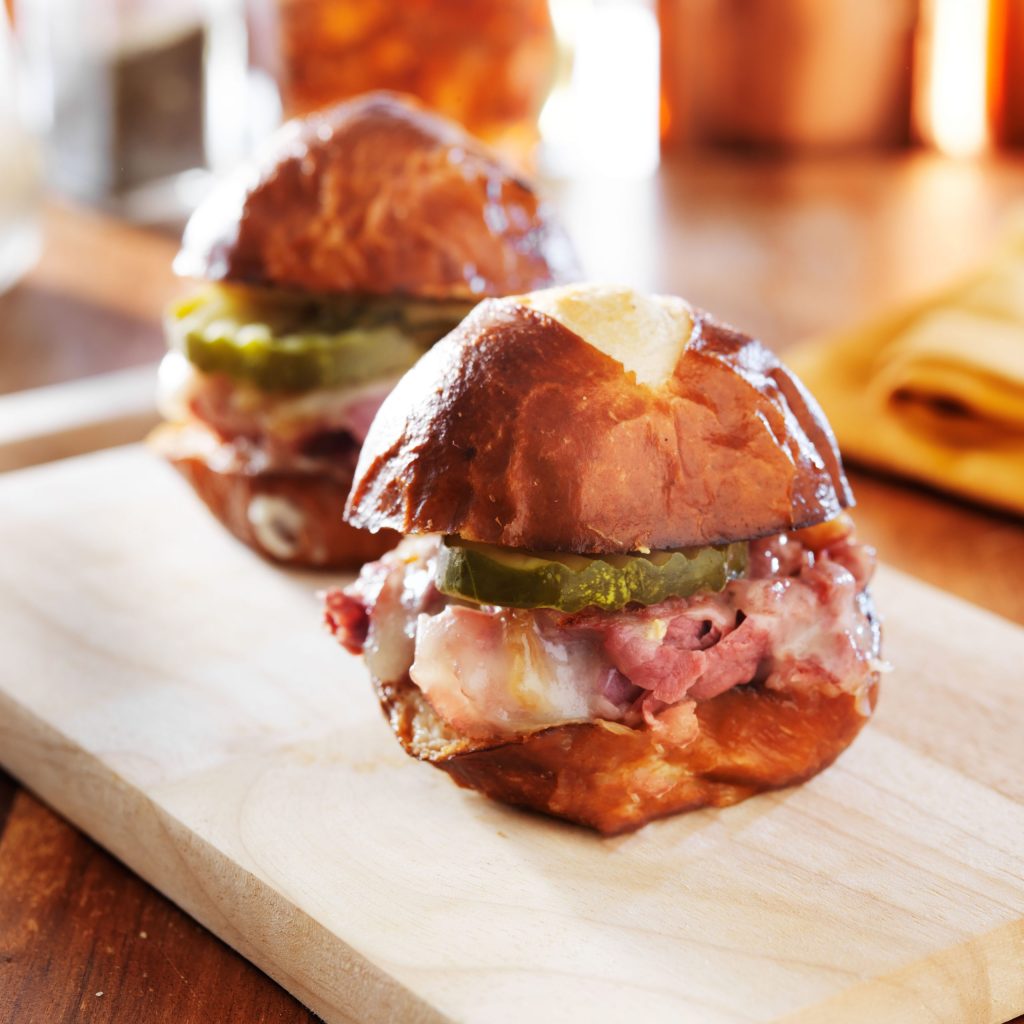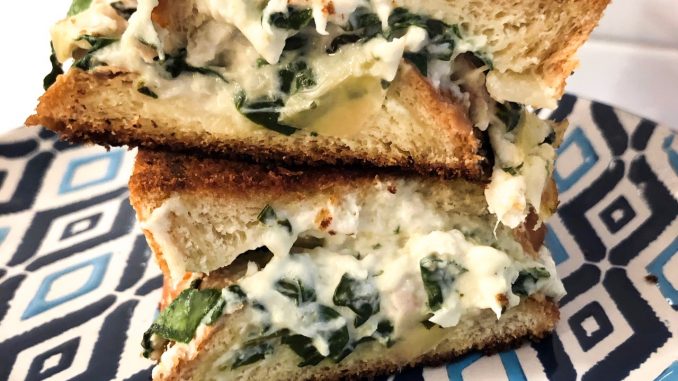Making Sandwiches Your Bread and Butter
April 1, 2019 | 11 min to read
As Millennials seek healthier meal choices, many are turning to supermarket delis, particularly for gourmet sandwich options. With delis evolving to compete against fast food chains and upscale shops, offerings now include innovative breads and ethical meats. Key players like Toufayan Bakeries and Cibao Meat Products are adapting to trends such as gluten-free and organic ingredients. Additionally, tech enhancements like online ordering and appealing displays have boosted sales, making supermarkets key meal destinations.

With a rise of Millennials looking for healthier meal options, many are foregoing the usual fast food restaurants and turning to supermarkets for prepared foods, salad bars and freshly made offerings — and one of the most popular segments in the deli department is a sandwich program.
More people than ever before are thinking of supermarket delis as meal destinations.
That’s why offering a sandwich program is a golden opportunity for supermarket delis to cater to the lunch crowd and attract people during the workday.
Many delis today offer signature sandwiches and a selection of gourmet offerings on paninis, wraps and different types of bread — and manufacturers of meats, cheeses and breads are making sure they are getting in on the additional business by teaming with deli departments on their products.
Daniel Levine, director of New York-based Avant-Guide Institute, a global trends consultancy, says sandwiches are getting fancier, and that’s also bringing a lot of eyes — and mouths — to the category.
“In general, deli sandwich makers are finding increased competition with ever more exotic offerings from QSR brands,” he says. “Delis are changing their game in response to an onslaught that includes KFC’s Cheetos Sandwich, McDonald’s Spicy McChicken Sandwich line, Carl’s Jr.’s Beyond Famous Star Burger (made with a Beyond Meat patty), Dunkin’ Power Breakfast Sandwich and Arby’s 5 Meat Mega Stack.”
There’s also competition from smaller shops. For example, in New York City, the upscale bagel chain Black Seed Bagels is now selling a bagel sandwich made with lobster cream cheese and, according to the company, has a taste that is simultaneously “tart, briny and crunchy.” Needless to say, for traditionalists this combo is definitely not kosher — either literally or figuratively.
“Breakfast sandwiches are also having their moment, as many delis are seeing that upping their morning game ups their profits,” notes Levine. “An example of this I’m seeing around is a BLT with scrambled egg in a bun with balsamic mayo.”
An Evolution
Karen Toufayan, vice president of marketing and sales at Toufayan Bakeries, headquartered in Ridgefield, NJ, has been baking breads for more than 90 years, and many of its products are the foundation for a number of supermarket sandwich programs operating today.
Over the company’s long history, it has seen sandwich programs evolve in several different ways.
“First, healthier breads are becoming more popular — especially among the younger generations; for example gluten-free wraps, organic and all-natural options, and non-GMO have become more popular among today’s sandwich programs,” says Toufayan. “On the other end of the spectrum, more exciting taste options and fillings have also grown. Products like naan and brioche buns filled with more exotic or international flavors have grown in demand.”
In fact, Toufayan has recently introduced a number of new breads to keep up with these trends, such as all-natural naans, brioche buns, smart pockets and non-GMO gluten-free wraps. The company says it has experienced tremendous success so far.
The Role Of Meats
Cibao Meat Products, located in the Bronx, NY, has been providing sausage for more than 50 years, but made the decision to venture off into deli, and now the company features a variety of meat options for delis to choose from.
“It only made sense for us, since this is something we know so much about,” says Jaline G. Isidor Horta, digital marketing director for the company. “We currently have three new items — Induveca Ham, which is a ham cooked with natural juices, gluten free, low sodium and 98-percent fat free; a turkey breast, which is gluten free, contains no MSG, is browned in oil and allergen free; and a chicken breast, which is gluten free, MSG free, extra lean, only 60 calories per serving, fully cooked, and 98-percent fat and allergen free.”
Since it began offering these items to deli departments three years ago, it has seen great success, as have its deli partners. That’s why the company will soon be offering pastrami and is considering other meats to provide delis with in the future.
“We are all very excited where this new road is leading us,” says Isidor Horta. “We also ventured through the dairy lane and started a cheese called Queso Jeo. It is the perfect companion to go with any of our products. If you slice it thin and put it on your sandwich, it is delicious. It has a nice creamy texture, and it cuts smoothly. If you were to toast your sandwich, the cheese melts nice and even.”
Levine notes there is a trend toward ‘ethical’ meats, meaning the product comes from animals that were humanely raised.
“A good example of this is Applegate Organics’ Herb Turkey Breast, which is not just organic and preservative-free (another trend), but also sourced from farms that raise animals with ethics in mind,” he says. “That’s something many people consider when buying and eating meats in 2019, and one deli managers should be thinking about.”
Relevantly, McAlister’s Deli, a 400-location American sandwich chain, recently debuted a meatless Chimichurri Sandwich, the chain’s first-ever plant-based protein sandwich that also includes Provolone cheese, tomato, spring mix, balsamic onions and chimichurri aioli on a toasted ciabatta bun. This is something Levin says supermarket delis must pay attention to and provide similar offerings to ensure they don’t send customers back to the chains.
Bread Helps Bring The “Bread”
Kontos Foods Inc., which is based in Paterson, NJ, does its part for deli sandwich programs by supplying flatbreads, pita breads, paninis and filo bread. A number of supermarket delis have been using these offerings to make fresh sandwiches and note a rise in sales.
“We do very well with pre-grilled breads, where we make them with the grill marks already on the product, which the deli departments love. The sandwiches can be stacked in refrigerators, because our thickness holds up well, allowing staff to pre-make the sandwiches; when the busy time comes, they have them at the ready,” says Donna Appy, regional sales manager for the company. “They don’t need to press the sandwich, since we did that already, so all they need to do is heat it up for a couple of seconds, and they are out the door.”
She says any Mediterranean bread is very popular with today’s consumers, as people rarely look to white breads, opting instead for artisan tastes.
“We have a gyro bread that we spray with oil that, when heated, is very flexible and is almost like a soft taco shell. We find younger groups are looking for products like these — things different than the traditional sub sandwich that sandwich shops offer,” says Appy. “We have a tandoori oval-shaped bread that can be layered and is also a favorite at the deli counter because it’s different.”
Appy notes the rise in these sandwich sales also is a big driver for Kontos’ sales, as people get interested and look to buy the breads to make sandwiches at home. This helps increase sales in the store, as well.
“The delis are asking me for more products so they can sell it in front of the supermarket deli counter for customers to take home,” she says.
Tech Matters
Many supermarket delis have installed tech or turned to online ordering to help compete with the likes of Panera Bread, Cava and Chipotle Mexican Grill, allowing customers to quickly place their order and have it ready when they arrive.
For example, Publix has a feature on its website and app where customers can create their sandwiches ahead of time, and H-E-B stores utilize its mobile app to send out information on the sandwich specials of the day, along with ingredient lists and daily deals.
Some grocers also are teaming with food delivery services, such as Grubhub and DoorDash, to have their sandwiches brought directly to a customer’s home or work place, further increasing business.
Marketing Tips
Isidor Horta suggests that deli programs market sandwiches with beautiful images, which include an artisan bread and the meats almost coming out of the bread, slices of cheese, tomatoes and lettuce with a side dish of freshly made fries.
Toufayan says a big component of a successful deli sandwich program comes down to those in charge doing more than just putting out signs and advertisements about what’s available.
“Both the more adventurous tasting options and the healthier variations are the focus of the more progressive retailers,” she says. “A number of retailers also point to the calorie content of their offerings, when it’s relevant. This brings more people to look and buy. And that’s the goal everyone should be gunning for.”
Still, there’s nothing wrong with the old-fashioned merchandising tricks. She notes using enhanced-product beauty shots to entice potential customers and “trigger the crave” is being used more aggressively than in the past.
Kontos Foods’ Appy says stores that stack pre-made sandwiches are finding it to be very impactful for customers.
“They are almost telling the customer what to buy when they see it in the display cases versus just seeing it up on a menu board or menu,” she says. “It’s very appetizing, and those who are doing this are seeing an increase in sales.”
Kontos provides delis with signs that highlight the health benefits of the breads and point out unique differences. And it also has teamed with delis for in-store demos and tastings of different sandwiches utilizing their bread products.
It’s no surprise deli departments are seeing the benefits of offering gourmet and specialty sandwiches.
“At the deli department, they make the sandwiches fresh — where the bread is never too hard or too soft, the lettuce is nice and green, the tomatoes are perfectly sliced, plus the meats and cheese have a perfect balance,” says Isidor Horta. “When someone takes their first bite, they forget all of the hunger and enjoy the freshness of the ingredients. You can’t really get that anywhere else.” The opportunity is there for delis to benefit from these programs.. DB

The Perfect Complement
There are some things that just go perfectly together — peanut butter and jelly, milk and cookies, Ernie and Bert — and when it comes to the perfect sandwich, everyone has their own idea on what condiment equals perfection.
It wasn’t long ago when things as simple as ketchup, mustard and mayonnaise were the only condiment options available at a deli counter. While some people still enjoy these traditional choices, any condiment selection that doesn’t have at least 10 different products is almost considered laughable now.
Between sriracha, barbecue sauce, different hot sauces, soy sauce, salad dressings and variations of all of the above, there are a multitude of flavors people like to add to their sandwiches; plus there are things like hummus, salsa, pesto, guacamole and different oils that many consumers consider condiments and necessary to complete the ideal sandwich.
While Don’s Food Products, based in Philadelphia, doesn’t make normal condiments like ketchup or mustard, the company does play a role with complementing sandwiches using some gourmet sides that go with any meal that comes from the deli.
Carl H. Cappelli, senior vice president of sales and business development for the company, points to Don’s Artichoke Asiago Cheese Dip as a unique option that’s a great addition to flatbreads, paninis or grilled chicken sandwiches.
“We’ve found the latest flavor trends for add-ons to be Korean, Asian and African inspired, which people really enjoy on their lunches,” he says. “We’ve also seen products that are pre-made, made fresh and made innovatively are big sellers.”
Tom Orlando, national sales director of Conroy Foods, headquartered in Pittsburgh, says some retailers are creating “free-from” or a “does not include” list of ingredients they offer to the consumer and merchandise with signage, which allows the consumer to know the quality and healthier options available to them.
“If you are purchasing a deli lunchmeat that is free from preservatives, why put a condiment that is full of them on the sandwich?” he asks.
Conroy Foods offers the Simple & Saucy Sandwich condiment product line, which is comprised of high-quality simple ingredients that are gluten-free and all natural.
“Each flavor has a distinctly artisan feel from classic flavors, such as Submarine Dressing made with 100 percent pure olive oil and red wine vinegar to the exciting, fiery Sriracha Mustard Sauce and the specialty mustards, Deli Dijon and Whole Grain,” says Orlando. “The Simple and Saucy sandwich condiment line meets the consumer demand for the natural option of clean ingredients for preparing gourmet sandwiches at home.”
When merchandising condiments, Orlando notes a deli just needs to provide a solution for the consumer; it doesn’t need to wow them with expensive fixtures.
“We have a cardboard shipper with themed header cards,” he says. “For example, our football-themed ‘Beano’s Deli Condiments Have All The Right Moves For Your Tailgate Party’ allows the consumer to pick up a bottle of each of the four choices for their tailgate purchase in the deli.”
Grab-and-Go: Making a Fast Decision
More and more retailers have a pre-packed deli area for the consumer who does not want to wait in line. These consumers grab some pre-sliced cheese, ham and maybe some turkey. Right above the grab-and-go case there is a selection of condiments that consumers will also grab, and their purchase decision is done.
“When you think about the practice, it is such common sense to place tertiary-use products close to primary driver purchase items,” says Orlando. “Everyone is time-starved when shopping, so if we make the trip as convenient and satisfying as possible, we all win. The busy consumer who needs to make school lunches for their children selects the different lunch meats and cheeses and right there, while they are waiting for their deli order, we position our condiments in fulfillment of their need.”
Orlando says the more diverse a product is in usage applications, the better, as a number of Conroy Foods’ products have multiple uses, such as the Pineapple Honey Mustard, which in addition to being a great condiment with ham also makes for a great dip for soft pretzels.
“Deli operators need to balance the classic condiment portfolio and also offer their own unique flavor or sandwich-matching profiles,” he says. “Our Cranberry Honey Mustard is a huge seasonal product paired with turkey sandwiches, but deli operators are finding consumers enjoy this sauce year-round on their turkey sandwiches.”By giving the consumer a few more twists to the regular condiment choices and developing innovative flavors that are exclusive to its program, the deli creates a signature offering to differentiate the department from its competition. db
6 of 7 article in DeliBusiness Apr/May 2019

